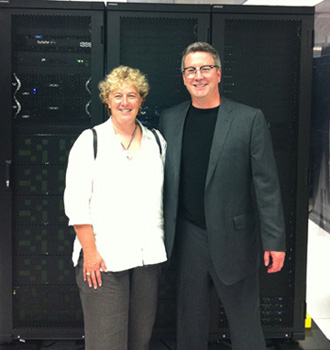Campus News
Hitachi sponsors UCSC research in cancer genomics and data storage
Two areas of expertise at UCSC, genomics and data storage, are brought together under a new research agreement sponsored by Hitachi.

Two areas of expertise at UC Santa Cruz–genomics and data storage–are brought together under a new research agreement sponsored by Hitachi. The agreement provides funding for cancer genomics research and the development of a “Genomics Medicine Integrated System,” a pilot information system for evaluating clinical and genomic data from cancer clinical trials.
In addition to initial research funding, Hitachi has provided a petabyte-capacity data storage system from Hitachi Data Systems Corp., making a total of more than $1 million in support for the project. UCSC researchers are using the storage system to manage cancer genomics data and study ways to improve the storage and processing of large amounts of genomic data.
The project involves experts in data storage, genome sequencing, and cancer genomics at UCSC’s Baskin School of Engineering. The data storage effort is led by Ethan Miller, professor of computer science and director of the Center for Research in Storage Systems (CRSS); genome sequencing work is led by Nader Pourmand, professor of biomolecular engineering and director of the UCSC Genome Technology Center; and Josh Stuart, professor of biomolecular engineering, is leading the genome analysis effort.
The UCSC team is partnering with cancer researcher Laura van ‘t Veer at UC San Francisco to perform genome sequencing and analysis for the I-SPY 2 breast cancer trial. “The I-SPY2 team is thrilled to work with UCSC experts in genomic data and have access to world class storage for our patient’s sequence data,” said van ‘t Veer, director of Applied Genomics and leader of the Breast Oncology Program at the UCSF Helen Diller Family Comprehensive Cancer Center.
I-SPY 2 is an innovative clinical trial for women with newly diagnosed locally advanced breast cancer that is testing the idea of tailoring treatment by using molecular tests to help identify which patients should be treated with investigational drugs. These drugs are administered prior to surgery in order to see the impact of the agent on the tumor. UCSC’s participation, funded by Hitachi, will add genomic data to the biomarkers that will be tested for their ability to predict a patient’s response to specific treatments.
“Results of our research will help enable genomic data analysis that could improve clinical treatment of cancer,” said CRSS director Miller.
Hitachi is an industry sponsor of CRSS and a major manufacturer of data storage and diagnostic healthcare systems. “In our meetings with Hitachi, they expressed a desire to do research with global social impact, and I-SPY 2 came to the top of the list,” said CRSS executive director Andy Hospodor, who will oversee the collaborative project.
Pourmand’s lab will perform RNA and DNA sequencing on samples from the I-SPY 2 trial, and Stuart’s group will analyze the sequence data. By comparing sequences from tumor and normal tissues from each patient, researchers hope to identify the specific mutations driving each patient’s cancer.
At the Genome Technology Center, Pourmand has developed advanced infrastructure and protocols for handling samples and generating high-quality sequence data. Stuart’s lab is involved in several major cancer genomics research projects and has developed analytical tools for identifying the genetic pathways affected by the mutations in cancer cells. A visiting researcher from Hitachi has been working in Stuart’s lab, jointly developing a new method to identify genomic markers of drug sensitivity and learning his group’s integrative approaches for cancer genomics.
While the sample analysis at UCSC has not yet begun on the enrolled I-SPY 2 patients, Stuart said his lab is already making good use of the Hitachi storage system for cancer genomics research.
“The petabyte storage system is a huge gift,” Stuart said. “We’re involved in a bioinformatics competition to predict breast cancer survival using gene expression data, and we were going to be mailing hard drives around the country to share data among participating groups until Hitachi stepped up to provide the storage system.”
UCSC’s storage systems researchers, meanwhile, are eager to begin studying the genomic data and how it is handled on the servers. Genome sequencing, as it becomes less expensive and more widely available, is generating overwhelming quantities of data. “We want to study this data in depth and see if we can reduce the footprint, improve the processing time, and minimize the bandwidth needed to move data from one place to another,” Hospodor said.
Art Ramirez, dean of the Baskin School of Engineering, said the collaborative project has great potential. “UCSC’s expertise in both genomics and storage systems are combined in this initiative, which is driven by a societal need and a market opportunity. We know that technological breakthroughs often happen when different disciplines come together, and we have high hopes for the Hitachi-UCSF-UCSC partnership,” he said.
“The work that UCSC does for genomics and cancer research maps to Hitachi’s social innovation commitments, and we are honored to contribute to research that will benefit breast cancer patients. The outcomes of the I-SPY 2 project will be beneficial to our mothers, wives, sisters and daughters, not to mention healthcare systems around the world,” said Bill Burns, vice president for health and life sciences at Hitachi Data Systems.
I-SPY 2 is sponsored by Quantum Leap Healthcare Collaborative, in collaboration with the Biomarkers Consortium (a partnership led by the Foundation for the National Institutes of Health, which includes the Food and Drug Administration, the National Institutes of Health, and a large number of partners from major pharmaceutical companies). It is a pre-competitive consortium that includes 20 leading clinical cancer centers across the U.S. and Canada, pharmaceutical and biomarker companies, and advocates. The I- SPY 2 Trial is led by Dr. Laura Esserman (Professor of Surgery and Radiology at UCSF) and Dr. Donald Berry (Professor of Biostatistics at MD Anderson) and supported by a working group of leading academic researchers across the country.